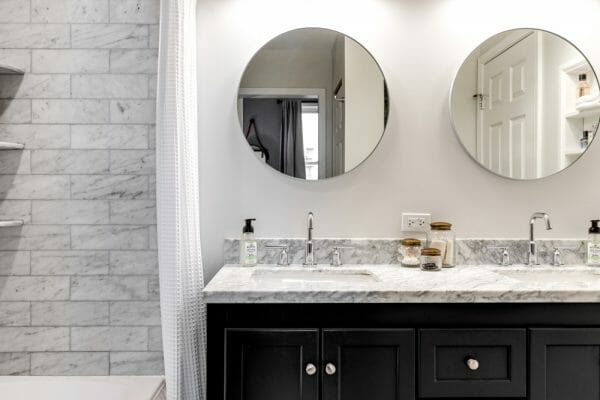A sleek and classically stylish bathroom vanity can be the star of the room. However, looks aren’t everything when it comes to countertops. You’ll want a material that gives you the style you’re going for and can also hold up to a bathroom’s wear and tear.
Bathrooms tend to be humid spaces. People at the vanity may expose the counter to spilled soap, toothpaste, hair products, and more. This means that you’ll need a countertop material that won’t stain or degrade when exposed to water and household chemicals.

When you’re choosing the right material for your bathroom vanity, think long-term. You’ll want something durable and easy to maintain. Here are a few options that suit a variety of budgets:
Six Great Materials For a Durable Bathroom Vanity
Granite
Granite is one of the most popular materials for a bathroom vanity for good reason. This stone is both stylish and durable. It’s available in a variety of colors, helping you achieve the look you want in the bathroom.
Granite is heat- and scratch-resistant. You won’t need to worry about setting down a hot curling iron. It’s unlikely that anything you keep on the bathroom vanity will scratch its surface.
However, unlike other materials on this list, granite needs to be regularly maintained. In wet environments like the bathroom, homeowners may need to seal it every year.
Engineered Stone
Another popular option is engineered stone. This can be made from granite, marble, quartz, and other materials.
Here, small pieces of stone are bound together in resin. The resulting material is durable, water-resistant, and low-maintenance.
One of the biggest advantages of engineered stone is that it comes in a vast array of colors and patterns. This lets you achieve exactly the look you want. These materials also tend to be more affordable than natural stones.
However, depending on the binder involved, engineered stones may be less heat-resistant. Some of these stones might also discolor over time. You’ll want to talk to your countertop supplier about your options.
Solid Surface Material
Here’s another man-made material with staying power. These countertops are made of acrylic and other materials bonded with resin and pressed into sheets. They are relatively affordable and fairly easy to maintain.
These counters won’t need to be sealed like granite. They’re extremely resistant to mold and mildew, perfect for bathroom application. Because these materials are solid, they rarely stain.
Solid surface vanities can be cut into almost any shape. They aren’t extremely scratch- and heat-resistant. However, if they do get damaged, you may be able to simply sand them down to unmarred layers.
Recycled Glass
Do you want a man-made material with a big visual impact? Recycled glass is affordable, eco-friendly, and offers a versatile look.
It’s available in multiple colors and base materials. A clear acrylic binder might make the glass look like reflections floating underwater. For a more rustic look, try a mosaic of glass embedded in concrete.
Durability varies a little depending on the base material. Concrete is heat-resistant but needs to be resealed regularly. Acrylic and resins never need sealing, but might be vulnerable to scratching.
Whichever you choose, make sure you use bathroom cleaners formulated for these materials. Harsh chemicals and scrubbing agents could damage or discolor the surface.
Ceramic Tile
Ceramic tiles have been a bathroom vanity staple for generations. They are highly heat- and scratch-resistant. The tiles themselves are unlikely to stain.
However, the grout between the tiles might stain. You can reduce the chances of that happening by re-sealing the grout periodically. You may also select larger tiles, so there are fewer lines of grout to worry about.
Some ceramic tiles are more impact resistant than others. They are rated on a variety of scales. Your vanity installation service can help you pick the right one for your needs.
Concrete
Concrete is becoming an increasingly popular choice for countertops. It’s readily available and can be formed into any shape you need. This is ideal for tricky spaces and large bathrooms.
This affordable material can be colored and patterned any way you like, depending on what dyes or accents are in the mix. Concrete is extremely durable and heat-resistant.
You will need to stay on top of maintenance with this material. Concrete can be damaged or stained when regularly exposed to water. It’s vital that you keep your bathroom vanity sealed.
Another thing to consider is that concrete can be difficult to patch or repair if it does get damaged. That’s one advantage of resin-based counters like simulated stone.
Which One’s Right for You?
So which bathroom vanity is right for you? Here are some points to consider:
Do you need to cover a large area? Manmade materials like concrete or quartz stone may be the answer.
Are you looking for the most visual impact? Classic granite and colorful and stunning glass lead the pack.
Do you dislike doing regular maintenance? Once installed, solid surface material and simulated stone take care of themselves.
Are you looking for a budget material that gives you a classic look? Tile and concrete are wallet-friendly options that come in a versatile range of colors and patterns.
Need Help Choosing a Durable Bathroom Vanity Top?
At Columbus Bath Design, we’ll help you find the right countertop material for your budget and your home. Our experienced team can handle any job, from working with oddly shaped spaces to coordinating with any design style. Give us a call today!

